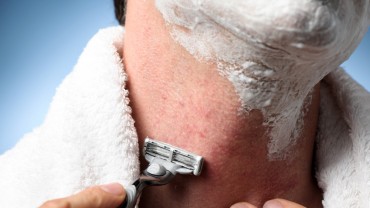22 Proven Home Remedies for Psoriasis
If you have psoriasis, you know all too well that this autoimmune disorder can be difficult and expensive to cure.
However, there are helpful, effective home remedies for psoriasis, which can cut down on the cost of getting medicinally treated.
Before trying any of these psoriasis home remedies, you should remember that the relief they provide might only be temporary.
However, as many people with autoimmune disorders will agree, temporary relief is better than no relief at all.
Before we jump into natural remedies for psoriasis, we’ll discuss how to determine whether you have psoriasis.
Psoriasis Symptoms
Psoriasis symptoms vary from person to person, and they can change over time.
However, some of the most common symptoms include dry skin (which can crack and bleed), red spots on the skin (covered in silvery scales), ridged or thickened nails, itching, soreness, burning, and swollen or stiff joints.
Affected areas range from small patches of dandruff-like flakes to large eruptions of redness and scaling.
The cause of psoriasis isn’t precisely known, but it appears to be autoimmune-related.
If you have psoriasis, your t-cells (a type of white blood cell) will mistakenly attack healthy skin cells, thinking they’re foreign invaders.
A cycle (of t-cells, other white blood cells, and skin cells) develops, which is generally only staved off by treatment.
To reduce psoriasis, knowing your triggers is crucial.
Psoriasis can be triggered by infections, stress, alcohol consumption, cold weather, and medications (such as lithium).
Types of Psoriasis
It’s also important to distinguish between several types of psoriasis.
The symptoms slightly vary and (in some cases) impact different parts of the body.
- Plaque psoriasis is the most common form of psoriasis. It’s marked by dry, raised skin plaques, which are covered in silvery scales. With this kind of psoriasis, you could have minor spots or full-blown episodes. Plaque psoriasis can form anywhere on the body (including inside your mouth).
- Nail psoriasis symptoms include the discoloration and abnormal growth of fingernails and toenails. In severe cases of nail psoriasis, nails can crack and crumble.
- Scalp psoriasis appears as red, itchy spots covered with white scales. You’ll notice dandruff-like flakes on your shoulders and throughout your hair. Flaking can extend just past the hairline, and appear on the back of the neck.
- Guttate psoriasis is most common among children and young adults. It can be triggered by bacterial infections, and it’s indicated by small sores that develop on your arms, trunk, scalp, and legs.
- Inverse psoriasis mainly impacts skin around the genitals, in the armpits, and under the breasts. Smooth, red patches of skin develop, and they’re often caused by fungal infections.
- Pustular psoriasis is uncommon but quick to develop. Pus-filled blisters appear on the tender skin, and these blisters may disappear and reappear. Other associated symptoms are diarrhea, chills, and fever.
- Erythrodermic psoriasis is the most uncommon form of psoriasis. It can cover your entire body with a massive red rash that itches or burns. Since this form is so uncommon, it can also be difficult to effectively treat, especially after a prolonged period of not receiving any treatment.
- Psoriatic arthritis causes red rashes, discolored nails, and stiff, painful joints. If left untreated, it can lead to permanent joint deformity.
As with any disease or disorder, you should see a doctor when symptoms become more than just temporary, minute agitations.
A sound medical diagnosis can help to better treat your form of psoriasis, even if you’re using home remedies for psoriasis.
Natural Remedies for Psoriasis
There are many at-home remedies for psoriasis.
Some of them are more effective than others.
All methods should be considered and researched as in-depth as possible before committing to trying any them.
The following are natural, at-home remedies that others have tried for treating their symptoms.
These psoriasis treatments range from dietary and lifestyle changes to supplements and topical creams.
Pick one or pick a few; try the ones that might be right for you.
Fish Oil
Fatty fishes (e.g., albacore tuna or salmon) are rich in omega-3 fatty acids, so fish oil supplements can help reduce inflammation.
Fish oils can help boost your immune system, and they’re great topical applicants when applied to the affected area(s) of skin.
Lukewarm Water
Whether you’re bathing in it or drinking it, avoid very cold or very hot water.
Always use lukewarm water.
Drinking chilled water or beverages can wreak havoc on your digestive system, and hot water can damage the tender skin around affected areas.
Lukewarm water can help detoxify your body.
And it works as an anti-inflammatory because it increases blood flow to the skin.
Drinking Water
In addition to drinking lukewarm water, you should have more than just the recommended 8 glasses of 8 ounces of water per day.
In fact, since your metabolism is exponentially slower than most people’s, you should be drinking 3 liters (0.80 gallons or about 13 cups) of water per day.
This extra hydration will optimize the functioning of your immune and digestive systems.
Exercise
We all know that exercise is crucial for health and well-being.
Even light exercise can be beneficial.
Regular weekly exercise can help reduce symptoms of psoriasis by promoting a healthier, more functional immune system.
It can also help improve digestion.
And it’s recommended for people with psoriasis whose symptoms are triggered or worsened by constipation.
Sweating helps eliminate toxins from your body, and exercise creates endorphins that boost your mood.
If you’re fortunate enough to have a paved trail or hiking area near your home, take advantage of it several times a week for an hour or so.
Yoga
Public exercise can be embarrassing for people with psoriasis, so doing in-home physical activities like yoga can be helpful to start out.
YouTube has a slew of fantastic yoga videos for all learning levels, and it can save you a trip to the gym.
Gluten-free Dieting
If you have psoriasis, chances are that you also have digestive issues; they’re one of the most common symptoms for all autoimmune disorders.
One of the biggest dietary culprits is gluten, a protein found in many types of grains that get made into food products (such as bread and cereal).
If you have psoriasis and digestive troubles, there’s the possibility that you’re gluten-intolerant.
While gluten intolerance can be tested by a medical professional, you can take steps to eliminate gluten from your diet.
Gluten cross-reacts with wheat, dairy, and soy, so you’ll have to eliminate many food items from your diet if you decide to go gluten-free.
However, eliminating gluten might significantly reduce skin irritation and inflammation.
Turmeric
This natural treatment for psoriasis has been used in Asia for centuries, and it’s becoming more widely acknowledged as a treatment for types of psoriasis.
Turmeric is a perennial, herbaceous plant. It’s part of the ginger family.
Turmeric is a powerful antioxidant and anti-inflammatory substance, which can also cleanse the liver of toxins.
It’s been shown to help alleviate symptoms of plaque psoriasis and psoriatic arthritis.
Studies are showing that turmeric might inhibit the activity of Ph-K enzyme, which leads to a reduced production of skin cells.
Turmeric is also anti-microbial and cleansing.
And it protects the liver and aids in weight loss.
It’s sold in the spice aisle of most grocery stores, and it’s relatively inexpensive.
In its powdered form, the recommended daily dosage of turmeric is 4-6 teaspoons.
Dead Sea Salts and Salt Baths
Located in Israel, the Dead Sea is a prominent travel destination for people with psoriasis — because of its apparent healing properties.
The Dead Sea is the lowest point on earth’s surface.
Therefore, it doesn’t receive many ultraviolet-B (short-wavelength) rays.
The water is richly concentrated with salt and minerals, and its natural atmospheric filter keeps pesky UVB rays at bay.
So sunbathers can enjoy the benefits of soaking in its water for longer periods of time without the risk of sunburn.
The Dead Sea is composed of magnesium chloride, potassium chloride, sodium chloride, calcium chloride, bromide, sulfates, insoluble water, and crystallized water.
Magnesium chloride speeds up metabolism, which is usually slow in people with psoriasis (because they suffer from a magnesium deficiency).
Calcium chloride helps unclog pores, thereby ridding them of harmful toxins that seep in from the environment.
Sodium improves skin permeability and removes toxins.
Potassium decreases water-retention issues within the body, and sulfur helps to regulate blood-sugar levels and the metabolism of fat.
Additionally, bromide and zinc are anti-inflammatory.
Dead Sea salts can help exfoliate your skin, increase blood circulation throughout your body, detoxify your skin, and make it more permeable.
One of the greatest physical and mental benefits of Dead Sea salts is that it can reduce stress (a major trigger for most people with psoriasis).
Tea Tree Oil
One of the popular psoriasis treatments is tea tree oil.
Taken from the leaves of the Melaleuca tree of Asia and Australia, tea tree oil has a strong combination of anti-inflammatory, anti-fungal, and anti-bacterial properties.
In its pure form, tea tree oil can be directly applied to less sensitive parts of the body (such as the legs and arms).
Use a cotton ball to apply tea tree oil, allow it time to soak in, and gently wash it off.
For those with psoriasis on more sensitive skin areas (such as the face or neck), first, dilute tea tree oil with virgin coconut oil.
Tea tree oil has been shown to help alleviate symptoms, but it can reduce psoriasis scars when regularly applied for several weeks.
Apple Cider Vinegar
Apple cider vinegar is another highly used at-home psoriasis treatments.
Due to its healing properties, vinegar has been used for several thousand years.
Apparently, Hippocrates even used it to treat wounds back in 420 B.C.
Vinegar is a powerful anti-bacterial substance, which is often as a disinfectant.
If you want to try apple cider vinegar, select raw, organic varieties.
To reduce itchiness, apple cider vinegar can be applied to the scalp.
You can also add one cup of apple cider vinegar to your bathwater.
Then use cotton balls or a gentle cloth to clean the affected areas.
In addition, you can put apple cider vinegar onto a washcloth.
Then use it as a compress on the affected area for a minute or two.
Capsaicin Cream
Capsaicin is a compound found in black pepper.
It can help reduce pain and itchiness.
While you can try black pepper itself, there are capsaicin creams that can be topically applied to irritated patches of skin.
It’s an excellent psoriasis cream, as it blocks nerve endings that transmit pain through the body.
And it reduces inflammation from psoriasis.
Oatmeal Baths
Oats sooth and repair skin damaged by psoriasis.
Taking a lukewarm bath infused with oatmeal can reduce irritation, dryness, scales, and redness.
If you strain natural oatmeal with muslin or a sock, it can help provide relief to psoriasis outbreaks on various parts of your body.
All-Natural Moisturizer
Having an all-natural moisturizer is absolutely essential for anyone with a form of psoriasis.
Ingredients that you should look for in a natural moisturizer include emollients (coconut oil, almond oil, or olive oil), humectants (glycerin or sorbitol), emulsifiers (borax, beeswax, lanolin, or lecithin), active ingredients (tea tree oil or shea butter), and penetration enhancers (essential oils, oleic acid, or linoleic acid).
Avoid products with mineral oils, parabens, alcohol, artificial colors (or fragrances), propylene glycol, and formaldehyde.
These ingredients can exacerbate irritation and be allergenic.
There are numerous all-natural skin moisturizers on the market.
So be sure to look for the ones that have positive reviews, fit your price range, and contain organic ingredients.
Aloe Vera
Aloe vera is a great topical treatment, which can help soothe psoriasis-created skin lesions.
Aloe vera contains numerous vitamins (including A, B12, C, E, and folic acid), over nine minerals (including calcium and magnesium), enzymes, amino acids, 12 anthraquinones (i.e., laxatives that help regulate digestion), salicylic acid, fatty acids, and sugars.
Aloe vera gel is helpful as a topical treatment, and aloe vera juice can be consumed to help regulate digestion and cleanse the body of harmful toxins.
There are also natural aloe vera shampoos, conditioners, and body washes available online and in stores.
Oregon Grapes
Although not as common as some of the treatments mentioned in this list, Oregon grapes (also known as “Mahonia”) have recently become more acknowledged as great at-home remedies for psoriasis.
Oregon grapes can help fight bacterial and fungal infections.
They can also slow down the overproduction of skin cells.
They’re available in supplement format.
In a study conducted on over 440 patients in Germany, 81% reported reduced or eliminated symptoms after treatment.
Milk Thistle
Milk thistle could potentially help alleviate symptoms of psoriasis and liver damage.
Researchers have discovered that milk thistle is beneficial for improving liver functioning since it contains silymarin (a composition of silicristin, silibinin, and silydianin).
Silymarin prevents hazardous toxins from entering the liver.
Milk thistle also appears to be helping individuals with psoriasis.
As an antioxidant and anti-inflammatory substance, milk thistle provides a much-needed boost to a struggling immune system.
If you want to give milk thistle a try, you’ll need to search for standardized extracts in tablet or capsule form.
They contain 70% of silymarin. The recommended daily dosage for milk thistle is 150 mg, taken twice per day.
However, you should generally follow the guidelines indicated on the package.
Exclude Artificial Refined Sugar
Natural sugars can remain part of the diet, but artificially refined sugar is problematic for those with autoimmune disorders.
In other words, cut out processed, packaged foods that can easily (and rather cheaply) be purchased from grocery stores.
Approximately 90% of refined sugar in the diets of Americans come from processed, packaged foods.
They contribute to weight struggles and autoimmune deficiencies.
Refined sugars are high on the glycemic index and cause inflammation.
Reducing inflammatory factors is crucial for people dealing with autoimmune disorders.
Get Plenty of Sunshine
The human body gets approximately 80% of Vitamin D through UV rays of sunlight.
However, many people simply don’t get enough sunshine.
But natural light has therapeutic value for people with autoimmune-related skin issues.
Ultraviolet-B therapy has been proven to help reduce the excessive number of t-cells generated within our bodies – by targeting two specific pathways to the immune system.
Many doctors who treat psoriasis claim that light therapy is much more effective and beneficial than topical steroid creams (which can damage the adrenal system).
UVB rays can slow t-cell production, thereby reducing skin inflammation and scaling.
Also, the light we get from the sun contains vitamin D (which most people with autoimmune disorders are deficient in).
If you live in a colder climate during the winter, the moderate usage of tanning beds during the winter months is recommended.
Get Enough Vitamin D3
Taking vitamin D3 supplements can also assist you.
If you live in a part of the world where you don’t see much sunshine for months at a time, you probably lack Vitamin D3.
It can be purchased over the counter.
Also known as cholecalciferol, Vitamin D is fat-soluble.
Whether from sunlight or supplements, Vitamin D enters the bloodstream and travels to the liver, where it’s converted into calcidiol.
The kidneys then convert some of that calcidiol into calcitriol (which is the biologically active form of vitamin D that gives us all the health benefits we need).
Vitamin D can help regulate immune and neuromuscular functions.
It’s responsible for slowing down the rapid overproduction of skin cells in people with psoriasis.
And it acts as an anti-inflammatory agent throughout the body.
Unfortunately, those with autoimmune disorders are usually deficient in vitamin D, due to various, often-interlinked symptoms (such as leaky gut, disturbed gut flora, elevated levels of toxins in the body, and low production of bile).
Flare-ups tend to happen in the winter since we get even less natural exposure to vitamin D.
Aside from getting sunlight, doing light therapy, and taking vitamin D3 supplements, you can add vitamin D to your diet and try applying topical skin treatments infused with vitamin D to affected areas.
Foods rich in vitamin D include cod liver oil, oily fish (especially salmon, tuna, trout, swordfish, and mackerel), egg yolks, milk, orange juice, mushrooms, spinach, and some types of cereals (though these should be avoided if you have a gluten intolerance).
But it’s difficult to get sufficient vitamin D from foods, so your best options are sunlight, light therapy, and supplements.
You should get your blood tested for vitamin D3 deficiency before putting yourself on supplements.
But a generally recommended initial dose is 2,000 IU of vitamin D supplements per day (for a span of several months).
After that, you should have your bloodwork redone to see if your levels are balancing out, and whether you need to adjust your dosage of vitamin D3 supplements.
Don’t Use Perfumes and Dyes
Maybe you’ve always struggled with skin irritation or allergic reactions after using body products or laundry detergents containing perfumes and/or dyes.
If so, you should probably use these items on a daily basis.
If you have psoriasis, you might want to consider chucking them in the trash.
Why? Perfumes and dyes can inflame psoriasis.
Fragrances (both synthetically and naturally derived) are known to be skin irritants.
Make the switch to hypoallergenic, fragrance-free, and dye-free body washes, soaps, hand lotions, deodorants, and laundry detergents.
Many of these products are available on the market for reasonable prices.
And chances are, you can also find online sellers on Etsy who make organic, fragrance-free, dye-free products.
There are also numerous online recipes for making your own fragrance-free and dye-free laundry detergents and body care products.
Change Your Eating Habits
According to Deirdre Earls (a registered dietitian and fellow psoriasis warrior), adopting a plant-based diet is absolutely essential for combating the numerous, persistent symptoms associated with psoriasis.
Many foods that people regularly enjoy are actually highly inflammatory in nature.
But if you have autoimmune disorders, you need to avoid them if you want to reverse your symptoms.
If you decide to switch to a plant-based diet, the most important thing you should note is that you need to give your body time to adjust (to new foods that are introduced and old foods that are removed).
You might notice some pretty significant changes in how you feel overall — not to mention how your physical symptoms noticeably alter over time.
Start by getting rid of processed foods and beverages.
You don’t have to throw every processed piece of food out right away.
But you should have an active plan for systematically eliminating these harmful foods and introducing healthier ones.
Start by increasing your intake of whole foods.
Add a few servings of fruits, vegetables, and whole grains to your daily diet.
Buy foods that are high in antioxidants and are known to be anti-inflammatory.
Berries and asparagus are great foods for you; a funny way to ensure that you include them is to make them into smoothies and salads.
Meats are okay in moderation, depending on the type.
But eliminate greasy, fatty meats. Just make sure you’re getting enough protein.
Cultured vegetables are rich in healthy probiotics, and they can be introduced into the diet via different recipes.
Take Probiotics
Probiotics are a fantastic way to alleviate symptoms of psoriasis and other autoimmune disorders.
Probiotics introduce healthy bacteria to your digestive system.
They promote healthy gut flora, boost the immune system, get rid of harmful toxins, aid in overall healthy digestion, and reduce inflammation in the gut.
In addition to orally ingesting probiotics, they can be topically applied to areas of skin affected by psoriasis.
Apply liquid probiotics to a cotton cloth, and rub it gently on top of the irritated skin.
A 2013 study released in the scholarly journal Gut Microbes found that probiotics can potentially reduce cytokines levels, thereby diminishing the presence of inflammation in patients with psoriasis.
Future studies will strive to expand on the possibility that probiotics provide a cure to psoriasis.
Conclusion
Psoriasis is a complicated autoimmune disorder that impacts many people across the globe.
While there is not currently a known, reputable, reliable cure for psoriasis, there are many home remedies for treating its various symptoms.
As evidenced by the list of above methods, natural home-based treatments exist.
They might not eliminate symptoms, but many people have experienced degrees of success in reversing the severity of their symptoms.
All of these methods won’t work for everyone since different types of psoriasis exist.
Our bodies all interact and respond in diverse ways.
However, as most people who deal with various symptoms of psoriasis know, even a temporary alleviation of symptoms is better than experiencing no relief at all.
Give a few of these treatments a try, and find out what works best for you.
FDA Compliance
The information on this website has not been evaluated by the Food & Drug Administration or any other medical body. We do not aim to diagnose, treat, cure or prevent any illness or disease. Information is shared for educational purposes only. You must consult your doctor before acting on any content on this website, especially if you are pregnant, nursing, taking medication, or have a medical condition.
HOW WOULD YOU RATE THIS ARTICLE?






I have a swollen scaby itchy psoriasis that never showed up until recently when a catistrofic car accident caused multiple breaks below the waste.
If that wasn’t bad enough, MRSA bacterial infection took my right leg and messed up my left knee. So heavy antibiotics for three years and knocked down to 3 times a week. I take probiotics, vitamins B-12, D-3, and multivitamin and I am still malnourished they say. So now what? Would my sunbathing all my life kept this away all these years,,,45 to be exact.